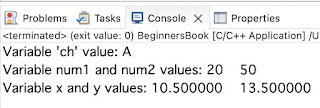Program to find a word in a file and display all its position
# include <stdio.h> # include <string.h> int main ( ) { char wrd [ 256 ] , buffer [ 256 ] ; int n , m , i , j , line ; FILE * fp ; fp = fopen ( "text.txt" , "r" ) ; // open file printf ( "Enter the word you want to search in the file: " ) ; gets ( wrd ) ; m = strlen ( wrd ) ; // length of input word printf ( "All positions of word \"%s\" in the file\n" , wrd ) ; line = 0 ; // the following loop the file fp line by line // each line is stored in buffer while ( fgets ( buffer , 256 , fp ) != NULL ) { i = 0 ; n = strlen ( buffer ) ; // the followinf loop find position of the input word in the current line and // print the position of the word on the screen // the loop basically reads each word of the file and compare it with the input word while ( i < n ) { // comparing current word with input word j = 0 ; while
